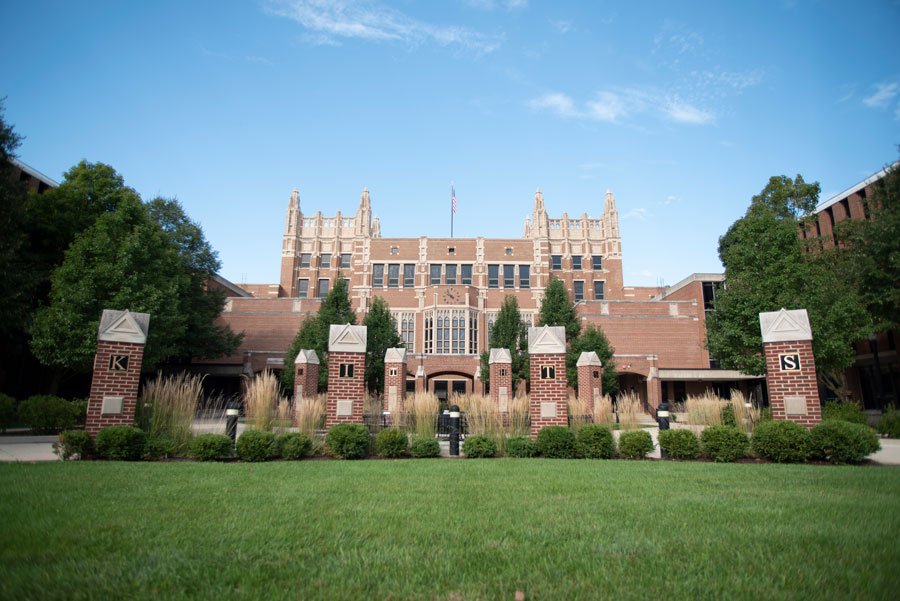ETHS administrators address questions about 2021-22 academic year in webinar
Daily file photo by Colin Boyle
Evanston Township High School. As plans for students to return next fall, administrators addressed questions and concerns regarding the 2021-22 academic year.
April 30, 2021
A panel of Evanston Township High School/District 202 administrators explained changes to the 2021-22 academic year during a Thursday webinar, emphasizing a “culture of care” as students plan on returning to full in-person learning this fall.
“We don’t intend for (full in-person instruction) to look and feel exactly like it was felt in the past,” District 202 superintendent Eric Witherspoon said. “We have a great opportunity here to also create that new normal.”
Following the announcement of changes to the 2021-22 academic year, the district distributed a poll to students, staff and families to assess questions and concerns. During the webinar, administrators answered frequently asked questions from the survey.
Assistant superintendent and principal Marcus Campbell said the district wants to emphasize an empathetic approach as students return back to school. Though Campbell said COVID-19 has been extraordinarily tough, it has made administrators reflect on how to improve ETHS.
“It has provided an opportunity for us to really pause and to think about what we’ve been doing,” he said. “The pandemic has given us a reason to come back with a thoughtful approach, with a careful approach, with an empathetic approach, and to be more humane in our thinking.”
When the 2021-22 academic year begins, all detention, tardies and social probations will be cleared from student records.
When students are late, they will now go directly to class instead of being sent out to receive a tardy slip, Kinzie said. Teachers will now record any tardies rather than safety staff — an approach she said will ensure students miss the least amount of instructional time as possible.
These changes will build on other restorative practices, she said.
“We are committed to teaching and learning and preparing students for the real world, and this includes learning from our mistakes for the future, developing students’ capacity for empathy and perspective-taking,” she said.
Another major change geared toward improving student well-being was eliminating semester exams. Pete Bavis, assistant superintendent for curriculum and instruction, said one of the biggest benefits is preparing students for college, since trends in higher education are shifting from exams to project-based assessments.
He added that the move to a new block schedule will provide time for deeper, ongoing assessments throughout the semester.
In the block schedule, classes will meet three days a week instead of five. Mondays will have eight blocks that meet for 33 minutes each, and all other days will each have four blocks with 85 minute classes and 10 minute passing periods.
Scott Bramley, the associate principal for instruction and literacy, said concerns about the pace of the traditional nine-period day have come up for years.
“We’re able to actually address some student well-being, address some faculty and staff well-being, by having our day slow down,” Bramley said.
The start time of the school day hasn’t changed, Bramley said, and the new schedule will not interfere with the courses selected for the 2021-22 academic year. He said students can still take up to eight classes.
One concern with the block schedule that was brought up in the poll was the impact longer classes might have on students’ focus. In response, Campbell said that teachers are not expected to teach 85 minutes, bell-to-bell.
Diona Lewis, the director of special education, also addressed how special education services will look next academic year.
“There will be no difference from previous school years with regard to student’s (Individualized Educational Plan) provisions,” Lewis said. “Students will still get the same minutes, services, accommodations and modifications as were determined by their IEP team.”
As time goes on, Campbell said they will continue to center students and that there will be more space for feedback.
“We will have additional opportunities for input, feedback and professional learning for staff as we create this vision together,” Campbell said. “This is something that is ongoing.”
Email: [email protected]
Twitter: @maxlubbers
Related Stories:
— ETHS announces changes to learning models for in-person fall
— ETHS to implement hybrid instruction in early April
— ETHS students reflect on switch to hybrid learning model


